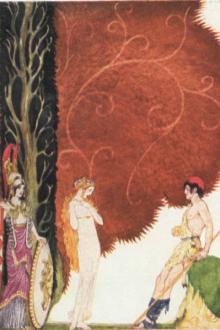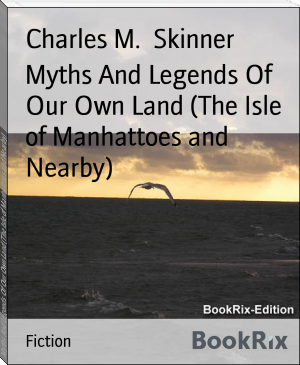The Adventures of Odysseus and The Tales of Troy - Padraic Colum (i read books .txt) 📗

- Author: Padraic Colum
- Performer: -
Book online «The Adventures of Odysseus and The Tales of Troy - Padraic Colum (i read books .txt) 📗». Author Padraic Colum
'But after we had taken and sacked King Priam's City, great troubles came upon us. Some of us sailed away, and some of us remained on the shore at the bidding of King Agamemnon, to make sacrifice to the gods. We separated, and the doom of death came to many of us. Nestor I saw at Lesbos, but none other of our friends have I ever since seen. Agamemnon, my own brother, came to his own land. But ah, it would have been happier for him if he had died on the plain of Troy, and if we had left a great barrow heaped above him! For he was slain in his own house and by one who had married the wife he had left behind. When the Ancient One of the Sea told me of my brother's doom I sat down upon the sand and wept, and I was minded to live no more nor to see the light of the sun.'
'And of thy father, Telemachus, I have told thee what I myself know and what was told me of him by the Ancient One of the Sea—how he stays on an Island where the nymph Calypso holds him against his will: but where that Island lies I do not know. Odysseus is there, and he cannot win back to his own country, seeing that he has no ship and no companions to help him to make his way across the sea. But Odysseus was ever master of devices. And also he is favoured greatly by the goddess, Pallas Athene. For these reasons, Telemachus, be hopeful that your father will yet reach his own home and country.'
XXIIIow the goddess, Pallas Athene, had thought for Telemachus, and she came to him where he lay in the vestibule of Menelaus' house. His comrade, Peisistratus was asleep, but Telemachus was wakeful, thinking upon his father.
Athene stood before his bed and said to him, 'Telemachus, no longer shouldst thou wander abroad, for the time has come when thou shouldst return. Come. Rouse Menelaus, and let him send thee upon thy way.'
Then Telemachus woke Peisistratus out of his sleep and told him that it was best that they should be going on their journey. But Peisistratus said, 'Tarry until it is dawn, Telemachus, when Menelaus will come to us and send us on our way.'
Then when it was light King Menelaus came to them. When he heard that they would depart he told the lady Helen to bid the maids prepare a meal for them. He himself, with Helen his wife, and Megapenthes, his son, went down into his treasure-chamber and brought forth for gifts to Telemachus a two-handled cup and a great mixing bowl of silver. And Helen took out of a chest a beautiful robe that she herself had made and embroidered. They came to Telemachus where he stood by the chariot with Peisistratus ready to depart. Then Menelaus gave him the beautiful two-handled cup that had been a gift to himself from the king of the Sidonians. Megapenthes brought up the great bowl of silver and put it in the chariot, and beautiful Helen came to him holding the embroidered robe.
'I too have a gift, dear child, for thee,' she said. 'Bring this robe home and leave it in thy mother's keeping. I want thee to have it to give to thy bride when thou bringest her into thy father's halls.'
Then were the horses yoked to the chariot and Telemachus and Peisistratus bade farewell to Menelaus and Helen who had treated them so kindly. As they were ready to go Menelaus poured out of a golden cup wine as an offering to the gods. And as Menelaus poured it out, Telemachus prayed that he might find Odysseus, his father, in his home.
Now as he prayed a bird flew from the right hand and over the horses' heads. It was an eagle, and it bore in its claws a goose that belonged to the farmyard. Telemachus asked Menelaus was this not a sign from Zeus, the greatest of the Gods.
Then said Helen, 'Hear me now, for I will prophesy from this sign to you. Even as yonder eagle has flown down from the mountain and killed a goose of the farmyard, so will Odysseus come from far to his home and kill the wooers who are there.'
'May Zeus grant that it be so,' said Telemachus. He spoke and lashed the horses, and they sped across the plain.
When they came near the city of Pylos, Telemachus spoke to his comrade, Peisistratus, and said:
'Do not take me past my ship, son of Nestor. Thy good father expects me to return to his house, but I fear that if I should, he, out of friendliness, would be anxious to make me stay many days. But I know that I should now return to Ithaka.'
The son of Nestor turned the horses towards the sea and they drove the chariot to where Telemachus' ship was anchored. Then Telemachus gathered his followers, and he bade them take on board the presents that Menelaus and Helen had given him.
They did this, and they raised the mast and the sails and the rowers took their seats on the benches. A breeze came and the sails took it and Telemachus and his companions sailed towards home. And all unknown to the youth, his father, Odysseus, was even then nearing his home.
PART IIHOW ODYSSEUS LEFT CALYPSO'S ISLAND AND CAME TO THE LAND OF THE PHÆACIANS; HOW HE TOLD HE FARED WITH THE CYCLÔPES AND WENT PAST THE TERRIBLE SCYLLA AND CHARYBDIS AND CAME TO THE ISLAND OF THRINACIA WHERE HIS MEN SLAUGHTERED THE CATTLE OF THE SUN; HOW HE WAS GIVEN A SHIP BY THE PHÆACIANS AND CAME TO HIS OWN LAND; HOW HE OVERTHREW THE WOOERS WHO WASTED HIS SUBSTANCE AND CAME TO REIGN AGAIN AS KING OF ITHAKA
ver mindful was Pallas Athene of Odysseus although she might not help him openly because of a wrong he had done Poseidon, the god of the sea. But she spoke at the council of the gods, and she won from Zeus a pledge that Odysseus would now be permitted to return to his own land. On that day she went to Ithaka, and, appearing to Telemachus, moved him, as has been told, to go on the voyage in search of his father. And on that day, too, Hermes, by the will of Zeus, went to Ogygia—to that Island where, as the Ancient One of the Sea had shown Menelaus, Odysseus was held by the nymph Calypso.
Beautiful indeed was that Island. All round the cave where Calypso lived was a blossoming wood—alder, poplar and cypress trees were there, and on their branches roosted long-winged birds—falcons and owls and chattering sea-crows. Before the cave was a soft meadow in which thousands of violets bloomed, and with four fountains that gushed out of the ground and made clear streams through the grass. Across the cave grew a straggling vine, heavy with clusters of grapes. Calypso was within the cave, and as Hermes came near, he heard her singing one of her magic songs.
She was before a loom weaving the threads with a golden shuttle. Now she knew Hermes and was pleased to see him on her Island, but as soon as he spoke of Odysseus and how it was the will of Zeus that he should be permitted to leave the Island, her song ceased and the golden shuttle fell from her hand.
'Woe to me,' she said, 'and woe to any immortal who loves a mortal, for the gods are always jealous of their love. I do not hold him here because I hate Odysseus, but because I love him greatly, and would have him dwell with me here,—more than this, Hermes, I would make him an immortal so that he would know neither old age nor death.'
'He does not desire to be freed from old age and death,' said Hermes, 'he desires to return to his own land and to live with his dear wife, Penelope, and his son, Telemachus. And Zeus, the greatest of the gods, commands that you let him go upon his way.'
'I have no ship to give him,' said Calypso, 'and I have no company of men to help him to cross the sea,'
'He must leave the Island and cross the sea—Zeus commands it,' Hermes said.
'I must help him to make his way across the sea if it must be so,' Calypso said. Then she bowed her head and Hermes went from her.
Straightway Calypso left her cave and went down to the sea. By the shore Odysseus stayed, looking across the wide sea with tears in his eyes.
She came to him and she said, 'Be not sorrowful any more, Odysseus. The time has come when thou mayst depart from my Island. Come now. I will show how I can help thee on thy way.'
he brought him to the side of the Island where great trees grew and she put in his hands a double-edged axe and an adze. Then Odysseus started to hew down the timber. Twenty trees he felled with his axe of bronze, and he smoothed them and made straight the line. Calypso came to him at the dawn of the next day; she brought augers for boring and he made the beams fast. He built a raft, making it very broad, and set a mast upon it and fixed a rudder to guide it. To make it more secure, he wove out of osier rods a fence that went from stem to stern as a bulwark against the waves, and he strengthened the bulwark with wood placed behind. Calypso wove him a web of cloth for sails, and these he made very skilfully. Then he fastened the braces and the halyards and sheets, and he pushed the raft, with levers down to the sea.
That was on the fourth day. On the fifth Calypso gave him garments for the journey and brought provision down to the raft—two skins of wine and a great skin of water; corn and many dainties. She showed Odysseus how to guide his course by the star that some call the Bear and others the Wain, and she bade farewell to him. He took his place on the raft and set his sail to the breeze and he sailed away from Ogygia, the island where Calypso had held him for so long.
But not easily or safely did he make his way across the sea. The winds blew upon his raft and the waves dashed against it; a fierce blast came and broke the mast in the middle; the sail and the arm-yard fell into the deep. Then Odysseus was flung down on the bottom of the raft. For a long time he lay there overwhelmed by the water that broke over him. The winds drove the raft to and fro—the South wind tossed it to the North to bear along, and the East wind tossed it to the West to chase.
In the depths of the sea





Comments (0)